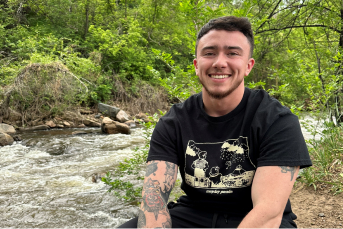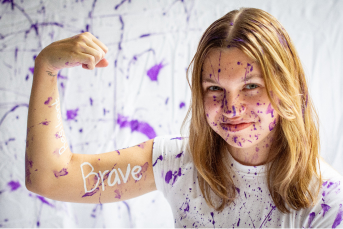
Born and raised on the beaches of California, Jared has been surfing his entire life and now lives with his wife and son. Read his full epilepsy story below.
The love for surfing
I'm a California kid, I grew up on the beach in California. My family lived there in the summer and every day we were at the beach. Surfing swallowed me up by high school and it became my passion. I tried to balance it with my studies but it's all I wanted to do!
I tell people with epilepsy to not surf exactly how I do - I just surf. But my tips are
- Buy impact wetsuits - if you're ever in the water they keep you afloat and face up, so that someone can save you.
- Make sure you're out with someone who knows about your epilepsy and about seizure first aid.
- Let the ocean decide what you surf, don’t paddle out if you don’t feel comfortable, go for it when you are ready!
The ocean is beautiful and powerful but don't put yourself in any danger.

Jared’s epilepsy story
I was 17 and I went to visit my friend in the hospital while she was having a video EEG for her epilepsy. After we hung out I cycled home and woke up with a bunch of EMTs around me. I’d had a tonic clonic seizure. Following this, they’d happen once every 6 months. They thought my epilepsy was caused by multiple concussions and a broken back from surfing or water polo.
In my third year of college, I woke up with a tube in my throat, I had been in a coma for 10 days. If my friend hadn't come to pick me up for a surf in the morning, I probably wouldn't be here right now. As I started my professional career, my seizures became more diverse. In 2015 over Thanksgiving I was having bad seizures and I couldn't control them, so I went to the hospital - I decided to be more upfront and honest to myself and my family. I stood my ground and said I'm going to do this differently!
I started seeing a doctor at UCLA and I'll always remember the first couple of appointments. He asked my parents and wife about my seizures and body movements, then he spoke to me after. It was stressful because he was looking at it in lots of detail. Our son is named Atlas because my wife loves to travel, she was in Africa on a safari and I just finished a bunch of tests. My test results came through that evening, the diagnosis was focal cortical dysplasia located on my front-left temporal lobe, I Googled it and saw it’s a form of epilepsy that does not work with medications and requires surgery. Over the years I would forget words and would say something completely different e.g. "chicken" instead of "coffee". Now, after surgery, I experience a clearer brain and look back at it as a fun road to find the safest option that works for me.
Life after surgery
I’m currently 3 years seizure free bar one small one and take a lot less medication. They probably would have taken the dose down a little more in normal times but since the COVID-19 pandemic my tests have slowed down, and we are taking a more cautious approach to reducing dosages.
Read more: Appointments with your doctor during COVID-19

Jared’s career
I’m a Sociology graduate from the University of California, I wanted to understand why everyone doesn’t love each other. I started college in 2007 when Facebook, Instagram and Twitter were all just starting to become big. Digital media was the new route for activism and I saw this as a great path for me. After I finished college, a job popped up as a Social Media and Community Manager at Surfline. But I had always dreamed of working at Patagonia, and eventually an opportunity came up - and I've worked there for over 6 years now.
Epilepsy Foundation advocacy
I decided to get into paddling to keep in shape in the summertime, I thought of the idea to do a Facebook live 17-mile paddle for epilepsy awareness. My boss thought it sounded awesome - my whole office and friends rallied around me. I’d previously never heard of the Epilepsy Foundation but they called me and were really enthusiastic. After the paddle I wanted to keep raising awareness for but I also wanted more tests on my brain.
I've done several paddles, I did one right before the brain surgery and one right before my son was born. We were getting ready to do a surf event for epilepsy but then the pandemic hit. I do a lot of PR and anything I can to help raise as much awareness as possible. I can be quite a private person and prefer to just talk with my friends or family privately. But for me, creating a support network through advocacy is the way I justify putting my face in front of it.
Talking about epilepsy as a man
It's interesting - most of the people I talk to about epilepsy are women. Male stigma in the US is “don't cry when you're hurt”, and don't talk about it. For the first 4-5 years, I didn't tell anyone - I didn't tell my first employer and it ended badly in the office, so I learnt my lesson. Injuries and epilepsy are horrible, the only way to end the stigma males feel is through communication, we've got to talk to each other.
If you tell your peer and they judge you, then do you actually want them as a friend? Everyone has got different battles, not everyone likes to talk about it. On social media I talk to 2 guys about having epilepsy but they never post about it.
Read more: Talking about men and epilepsy
Message to others
Epilepsy is a consistent challenge, but it gives you the opportunity to find your best skills and traits. It takes determination and you need a team, but you can go for it if you're determined. Your epilepsy is centered on you, you have to be the leader, and show a bit of empathy to yourself. I find it to be a good parallel to the general issues of society - epilepsy is easy to generalize from the outside, but is very different from within.

















